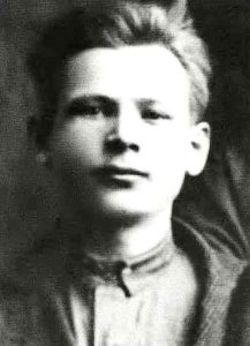Konstantin Chernenko - Early Life
 Konstantin Ustiyinovich Chernenko was born on September 11 (24), 1911, in a village of Bolshaya Tes in the Novoselovsky District of the Krasnoyarsk Territory in a Russian peasant family. His father, Ustin Demidovich was a settler from Ukraine. He worked on copper mines, gold mines in Siberia. About the name of Chernenko's mother, nothing is almost unknown, she died of typhus in 1919. Ustin married a second time. From the first marriage there were two daughters and two sons. From an early age, Konstantin Chernenko worked as a hired clerk. But all Chernenko photo of Chernenko's subsequent work activities are connected with leading work in the Komsomol, and then in the party organizations.
Konstantin Ustiyinovich Chernenko was born on September 11 (24), 1911, in a village of Bolshaya Tes in the Novoselovsky District of the Krasnoyarsk Territory in a Russian peasant family. His father, Ustin Demidovich was a settler from Ukraine. He worked on copper mines, gold mines in Siberia. About the name of Chernenko's mother, nothing is almost unknown, she died of typhus in 1919. Ustin married a second time. From the first marriage there were two daughters and two sons. From an early age, Konstantin Chernenko worked as a hired clerk. But all Chernenko photo of Chernenko's subsequent work activities are connected with leading work in the Komsomol, and then in the party organizations.
In the years 1929-30, Konstantin Chernenko was in charge of the Propaganda and Agitation Department of the Novoselovsky District Committee of the Komsomol of the Krasnoyarsk Territory. He graduated from the 3-year school of rural youth. Political beliefs made it possible to appoint him head of the department of propaganda and agitation of the district committee of the Komsomol.
After three years in the border guards from 1930 to 1933, Chernenko spent eight years in low-level ideological work in his native Krasnoyarsk Kray, where, at the age of 31, he became a kraykom secretary (presumably the secretary for ideological work). His performance must not have been distinguished, however, for in 1943, at the height of the war, he was sent for two years to college-the Higher School of Party Organizers. His work during the war was marked only with the medal "For Valiant Labor."
In 1945, he was again made an obkom secretary for ideology, but in a less important oblast, Penza. And here the career failed. A letter came from Moscow from some woman who claimed that Chernenko was an immoral person who lived in several families at once. Subsequently, Chernenko tried to hide as much as possible, or completely destroy, all the documents related to the party verification of this fact. It is known, however, that the party comrades came to the conclusion that certain facts defaming Konstantin Ustinovich had taken place. His career was not completely destroyed by this, but instead of Moscow in 1948 he was moved to a still lower job. He ended up in Chisinau, taking up the post of head of the propaganda and agitation department of the Central Committee of the Communist Party of Moldova. Although as a Russian outsider he, rather than the Moldavian who held the title, may have been serving as the real ideological secretary.
Two years later Leonid Brezhnev became the First Secretary of the Central Committee of the Communist Party of Moldova.
|
NEWSLETTER
|
| Join the GlobalSecurity.org mailing list |
|
|
|

